PCOS basics and natural ways to manage it. Because it’s no joke, period.
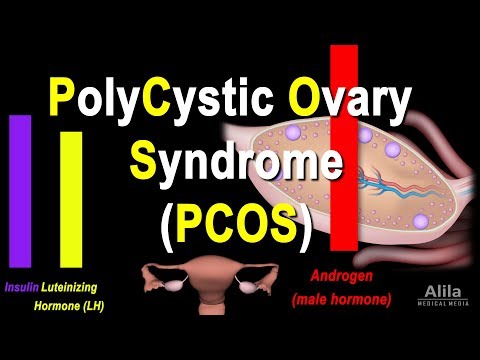
PCOS stands for Polycystic Ovary Syndrome. Does that sound familiar?
PCOS affects women’s hormones; women experiencing PCOS produce above- normal amounts of male dominant hormones.
The resulting hormonal imbalance produces serious menstrual and reproductive irregularities.
More...

Between 5-10% of women between 15 and 44, or during the childbearing years, have PCOS. Most of them find out they have it in their 20s and 30s. It is when they battle to get pregnant and go and see their doctor that it becomes diagnosed.
For others it is when other symptoms associated with the higher levels of male hormones arise that they consult their doctor and find out they have PCOS. Race and ethnicity don’t play a role with this condition – any woman can get it, but your risk of getting it is higher if you are obese or if you have close family members who have it.
About PCOS
PCOS is a common hormonal imbalance which affects women today and is sometimes characterized by insulin resistance. Not every woman is affected by insulin resistance in the same way. Some women develop PCOS and some don’t.
If a woman does have insulin resistance or PCOS, she would be at risk of developing gestational diabetes during pregnancy.
As you can see, the endocrine system is a complex part of the body. Unfortunately, PCOS, even though diagnosed and recognized for the past 75 years, is now considered a leader in endocrine disruption in women who are of reproductive age.
Research continues and still keeps trying to figure out how this hormone imbalance occurs in women and what can be done to reverse it. Alarming, because the fact is, between 6-21% of women of childbearing age are affected by it, with less than 50% of them being properly diagnosed.
If that is the case, then millions of undiagnosed women are unaware of what is causing their symptoms. This is a huge issue when you consider that it is a major cause of infertility in women.
Some people call PCOS a “silent disorder” even though it is quite a common hormonal disorder in women. Can you imagine that up to 72% of women with PCOS know what it is to experience infertility, compared to 16% of non-PCOS women with those same issues?
On top of it, PCOS is also associated with having an increased risk of getting
- type 2 Diabetes
- endometrial
- cancer
- mood disorders
- fatty liver
- high blood sugar
- sleep apnea
- high cholesterol
- metabolic syndrome
- high blood pressure
- heart disease
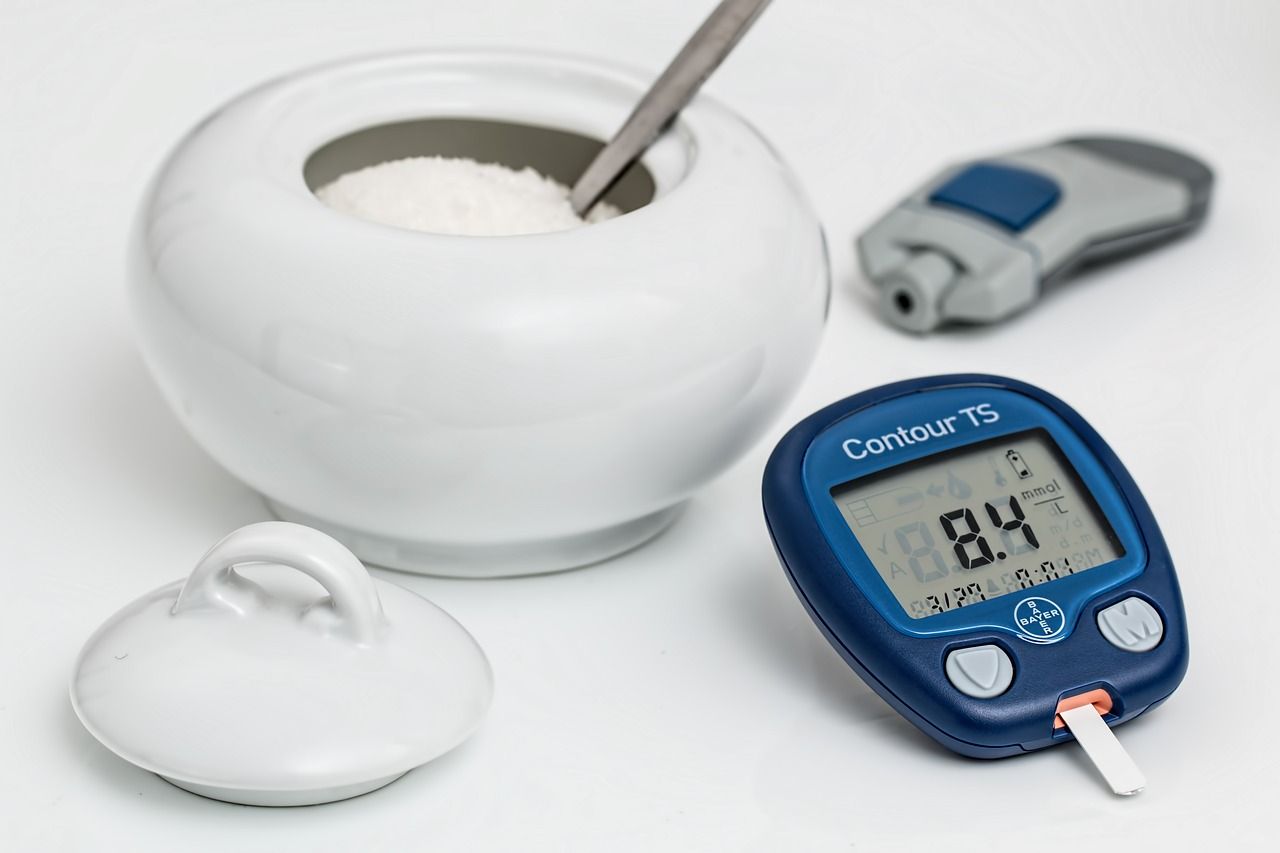
Fortunately, it’s not all doom and gloom and the good news is that PCOS can be managed naturally. A good way for a woman with PCOS to start tackling it is to try and get their hormones levels to an ideal balance using natural methods.
But before we give some great natural ways to do that, let’s first find out even more about PCOS.
Several reasons why PCOS develops
Symptoms can vary from one woman to another, but it is generally accepted that insulin resistance does play an important role in the development of the condition.
Fortunately, though, the underlying hormonal causes are noted to be reversible, or mostly so anyway, with many women finding good ways of lowering their symptoms without having to use medications.
PCOS symptoms can also come and go.
Lifestyle plays a very big part in symptoms brought about by insulin resistance, which affects many women with PCOS.
As mentioned above, if PCOS is not managed, it can increase a woman’s risk for longterm illnesses like hypertension, metabolic syndrome, high cholesterol, and diabetes.
PCOS: What should you look out for?
Women with hormonal issues might notice several symptoms:
Often, the ovaries will form functional ovarian cysts. This is where a sac forms on the surface of an ovary around a maturing egg. Once the egg gets released, the sac usually goes away. If the egg doesn’t get released or that sac we are speaking about closes around the egg, filling it with fluid, functional cysts can form.

The word, “polycystic” in PCOS means that the woman’s ovaries have several small cysts on them. Physicians will look for multiple cysts on a woman’s ovaries, but not all women who are diagnosed with PCOS have visible cysts.
Usually, a woman’s ovaries will release small amounts of male sex hormones. These are called androgens. However, for women who have PCOS, it seems, their ovaries will make more androgens.
That is the reason some women will develop some masculine symptoms or traits – they can experience extra body hair and facial hair, or even male pattern baldness, and other physical and mood problems.
- It is believed that over 60% of women who have an overproduction of androgens have PCOS. Let’s look at what the typical PCOS symptoms include
- Partial; maybe even total infertility.
- Irregular periods or even the complete loss of periods
- Difficulty to lose weight or to gain weight.
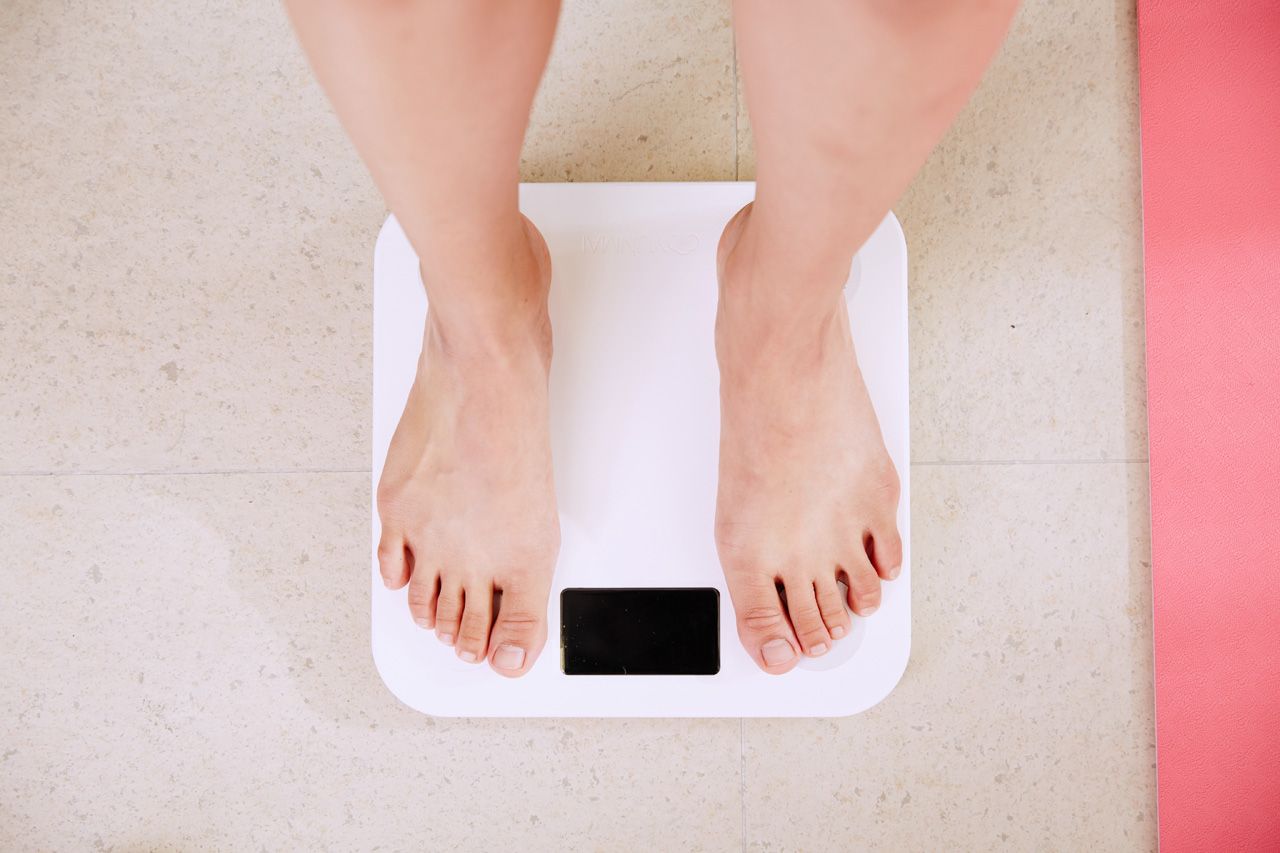
- Acne
- Insulin resistance -- which is related to an increased risk of diabetes and the risk of getting gestational diabetes in pregnancy.
- High testosterone hormone levels.
- Excessive hair growth in places that women don’t usually grow hair so much, such as on the abdomen and on the face.
- Thinning hair and possibly even male pattern baldness.
- Tiredness.
- Mood changes.
- Low sex drive.
What causes a woman to develop PCOS?
While the exact cause of PCOS is not altogether clear, there are a few theories on how it develops. When it comes to PCOS, it is not a matter of “one-size-fits-all”.
There will be numerous factors which could contribute to the development of this condition.
The main causes and risk factors are thought to include:
● Altered action of luteinizing hormones.
What are luteinizing hormones?
These hormones are produced by the pituitary gland. It is one of the main hormones that control a woman’s reproductive system.
● Insulin resistance
● Having a predisposition to hyperandrogenism which can be identified by the high levels of androgens.
See link above on ‘androgens’.
● Members of the family who have had PCOS.
● Smoking

Using alcohol excessively.
- Not having an active lifestyle.
- Epilepsy.
- Also, using the medicine that treats epilepsy, such as valproic acid.
- Gestational diabetes. It is still not clear, however, whether gestational diabetes leads to PCOS.
- If you had a high birth weight, and particularly if you were born to an overweight mother.
- Early puberty.
- Acanthosis nigricans, a skin condition characterized by areas of dark, velvety discoloration in body folds and creases.
- Metabolic syndrome.
It is also widely believed that obesity is a risk factor for PCOS. But clinicians appear to agree on their research, that even if you lose weight which is a top way to treat PCOS naturally, being overweight probably isn't the direct cause of PCOS.
However, it might bring on the symptoms faster. Many PCOS patients do deal with weight gain at some point down the line, but nevertheless, there are still a lot of women who are at normal weight; some are even underweight, and who also develop hormonal disruptions which lead to PCOS.
As mentioned above, this condition affects different women in different ways and PCOS patients come in all sizes and shapes.
Their histories can even be very diverse, and this makes treating and managing the condition even more complicated.
It has also been thought that PCOS was hereditary.
But while studying twins, it was shown that even though there is a strong genetic component to developing PCOS, other information shows that there is only a 32% chance of close relatives also having PCOS, which is listed under the risk factors above.
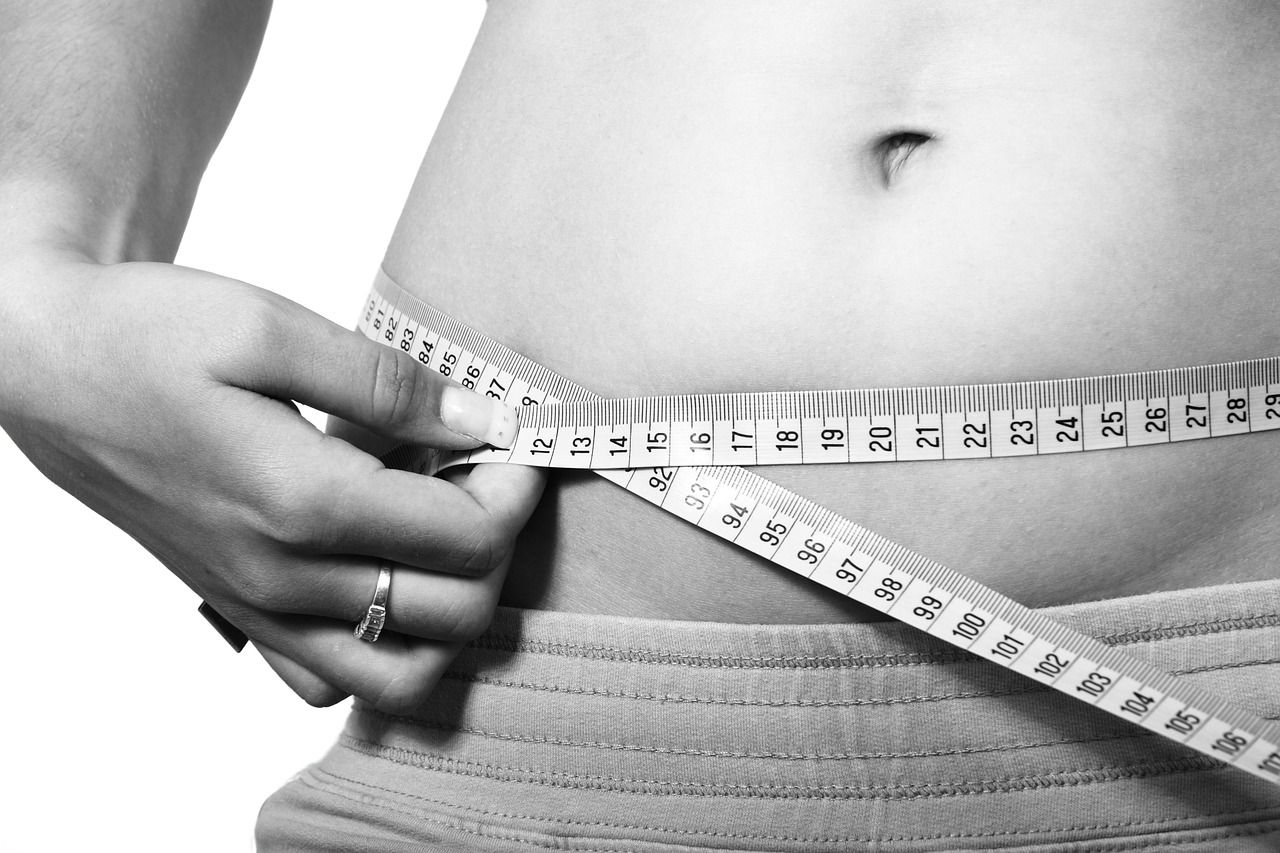
Women want to know can they still get pregnant if they have PCOS
Yes, they can.
Fortunately, PCOS is a common problem, but it is treatable and a condition that can be managed. The problem with having PCOS for women battling to get pregnant is that the hormonal imbalances interfere with the growth and release of the eggs from the ovaries.
This is called ovulation.
If you don’t ovulate, you can't get pregnant. Your doctor will discuss ways to induce ovulation with you. Some doctors will recommend the Ovulation Calculator to see which days in a woman’s menstrual cycle she is most likely to be fertile.
How is polycystic ovarian syndrome diagnosed?
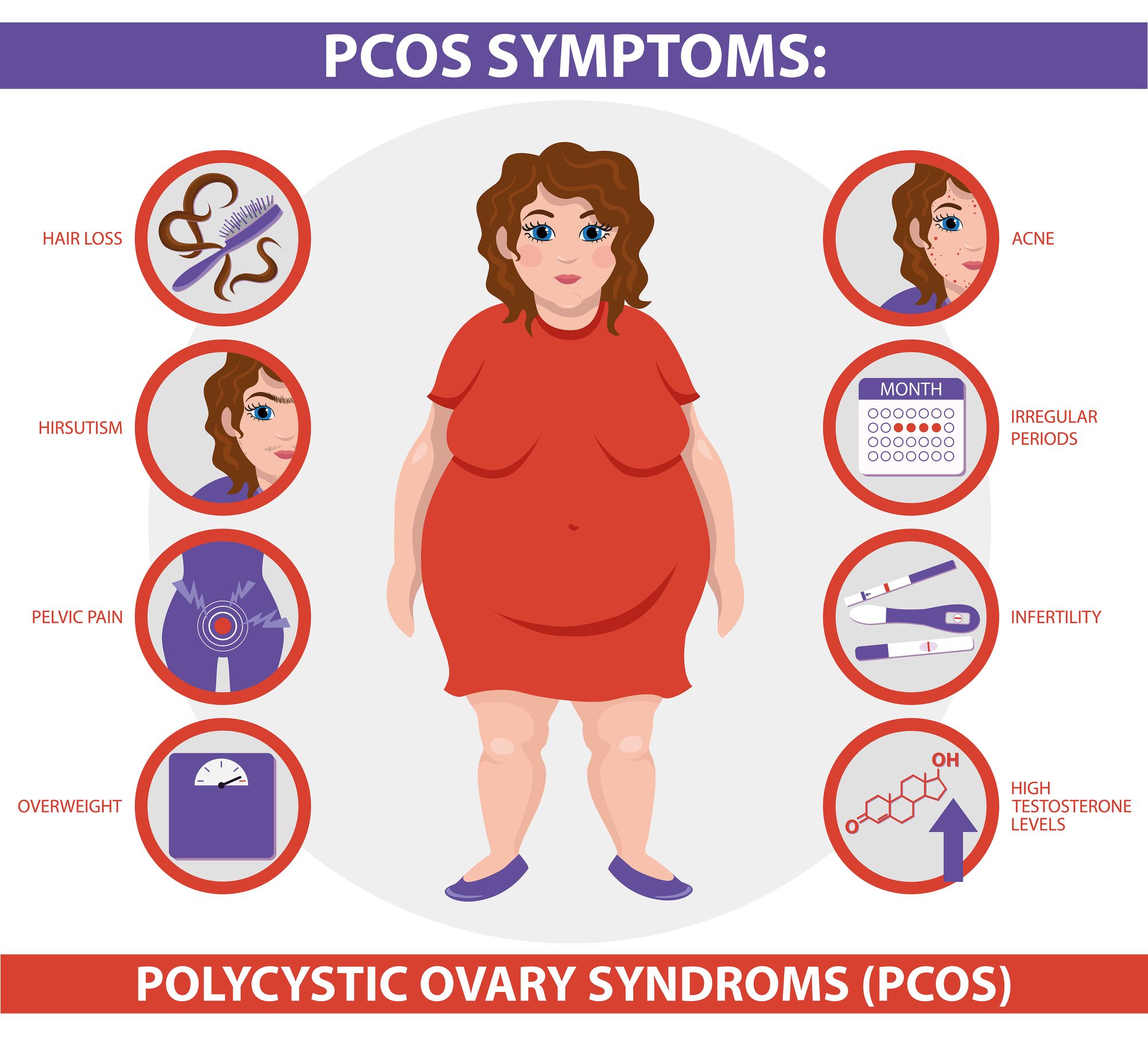
There is plenty of controversy regarding the criteria used to determine a diagnosis of PCOS; even how the condition should actually be labelled.
Some experts on PCOS even question whether the changes that take place in a woman with PCOS have actually ended up being over-diagnosed among women of reproductive age – as we mentioned, above, the treatment can vary.
There is a lot of different criteria these days for positive diagnosis of PCOS. However, all criteria require the following three symptoms:
- excess androgens in the women’s system
- experience of ovulatory dysfunction
Women’s polycystic ovaries
It will depend on which doctor you visit, and different doctors will use different methods to make their diagnosis.
What is the conventional treatment for PCOS?
The American Academy of Family Physicians says that treatment for PCOS should be treated “individually”, meaning each woman should be treated according to particular factors that relate to her.
Things like age, the severity of the symptoms, whether she is trying to get pregnant or not – all these will determine how the physician advises a specific woman.
The American Academy of Family physicians also says that patients should also be tested for other important things like blood pressure levels, lipid levels, triglycerides and cholesterol, levels, depression, glucose tolerance, and sleep apnea.
o If you are trying to get pregnant, there are conventional medicines which will dictate the various treatment plans.
Some commonly prescribed medications include a combination of birth control pills which could consist of oral contraceptives.
These contain estrogen plus progestin to help reduce the levels of male hormones which will also help in controlling excess hair growth and acne as well.
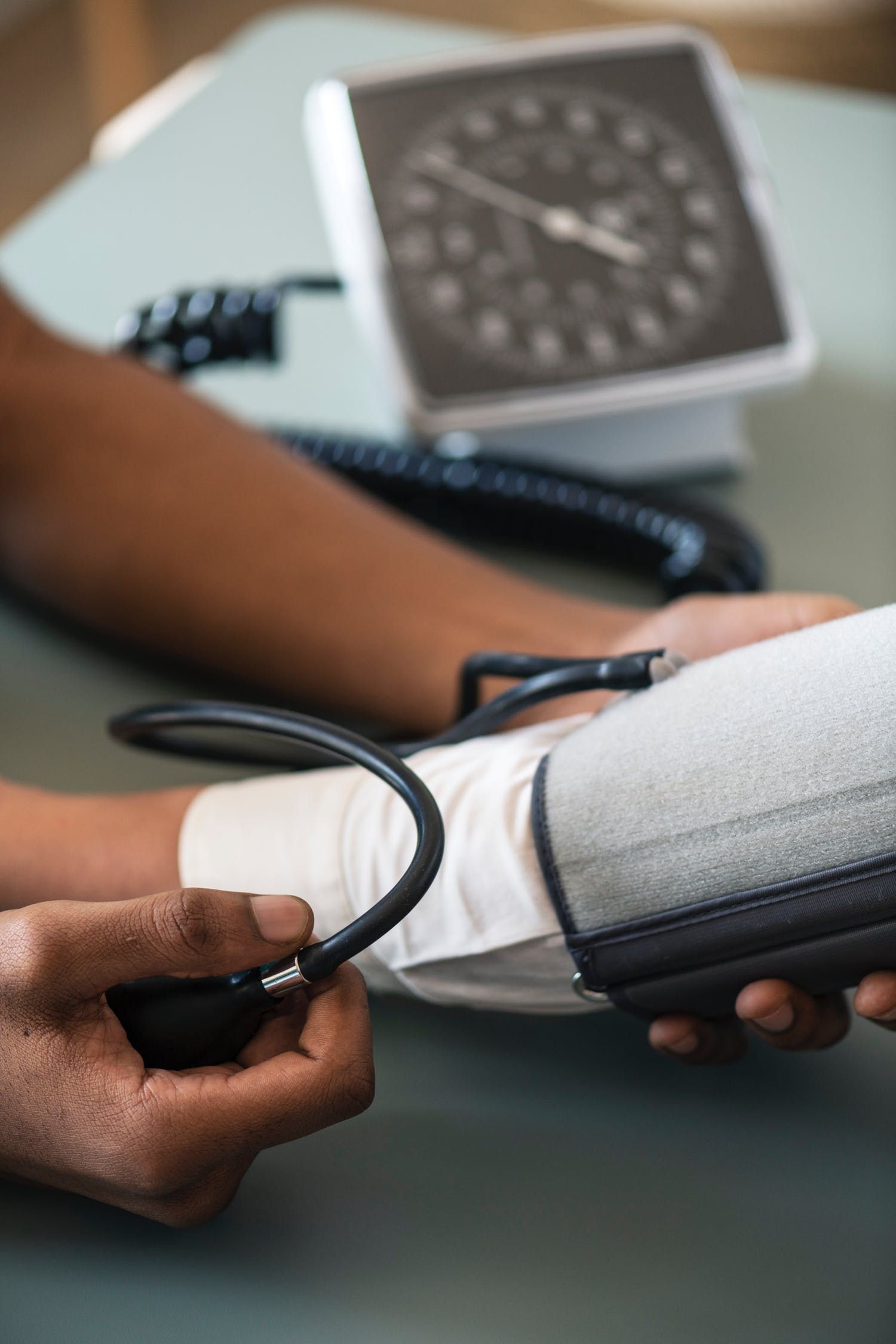
There are also wonderful natural remedies for PCOS symptoms
We have seen that PCOS is quite a complex condition. The road to resolving a woman’s hormonal imbalances and what causes the hormonal imbalances are not the same. Doctors, along with women with PCOS, agree that each woman is different and needs to be treated individually.
Diet and exercise play an important role in a woman’s reproductive system. A woman who is keen to go the natural route by taking natural remedies needs to realize that she needs to focus on all aspects of health and that means eating a balanced diet, maintaining a good body weight and trying to eliminate as much physical and psychological stress as possible.
Let’s look at well-researched natural remedies for PCOS symptoms:
1. Giving your diet a makeover

A diet that is low in carbs and high in healthy fats can really help you with weight loss.
Look at the keto diet or ketogenic diet. It was originally designed for children who had epilepsy so it focuses on drastically reducing carb intake. Most of the calories on this diet are obtained from healthy fats and protein.
Not only is it an excellent diet to follow, but it is outstanding for remedying brain fog. Lately, the focus has even been on how excellent it is for mental health too. Women with PCOS benefit from losing weight as well, which is associated with improving fertility problems.
The keto diet is powerful for insulin resistance, which also has links to fertility issues. Generally, any lifestyle-modifying diet which allows women with PCOS to lose weight will have benefits in restoring fertility and improving symptoms related to the condition.
2. Get plenty of rest

Sleep is vital for regenerating the cells, for hormone production, weight management, and stress control.
Sleep deprivation can have negative effects on a woman’s health and hormones if she has a poor diet without much activity.
Women with PCOS will probably have sleep disturbances as going without sleep increases stress hormones in the body.
The more stress you have, the more sleep you are likely to need. Some women with polycystic ovary syndrome may need at least 9 hours of good sleep.
3. Exercise goes without saying

If you are predisposed to having hormonal imbalances, you need to take note that women’s bodies are more susceptible to hormonal changes when they exercise to excess or over-train.
Take for example “Female Athlete Triad”, caused by too much exercise and a restricted diet, and too few calories.
Systems like these will have deleterious effects on hormonal health. o There are still heaps of benefits with exercise to benefit PCOS.
Those with PCOS might be unable to lose weight through exercise as easily as others do, but still, there is evidence to show that no matter the type of exercise you choose, when you exercise with PCOS you might improve your fertility markers, amongst improving on other health issues as well.
4. Don’t expose yourself to endocrine disruptors

What are endocrine disruptors? They are chemicals that interfere with a woman’s natural hormones. Women with hormonal disorders such as PCOS are sensitive to this type of disruption. High levels of endocrine disruptors such as bisphenol A can impact on the androgens in their bloodstream.
Some endocrine disruptors that affect PCOS can be:
● Pesticides
● Bisphenol A
● Phthalates
● Dioxins
● Phytoestrogens
● BPA
● DEHP
● DBP
Read about them here.
5. Take a supplement like Inositol
Inositol is a really good natural method of dealing with PCOS. You find inositol in grains, fruits, beans, and nuts.
Research supports the fact that inositol can greatly improve the symptoms of PCOS symptoms. Studies show that supplementing with inositol improves insulin resistance, lowers blood pressure and high triglycerides, and decreases male hormones in the bloodstream.
Good news is that inositol seems to promote ovulation, which helps to support fertility. Using inositol supplements can even combat the mental risks involved with PCOS.
6. Try Acupuncture
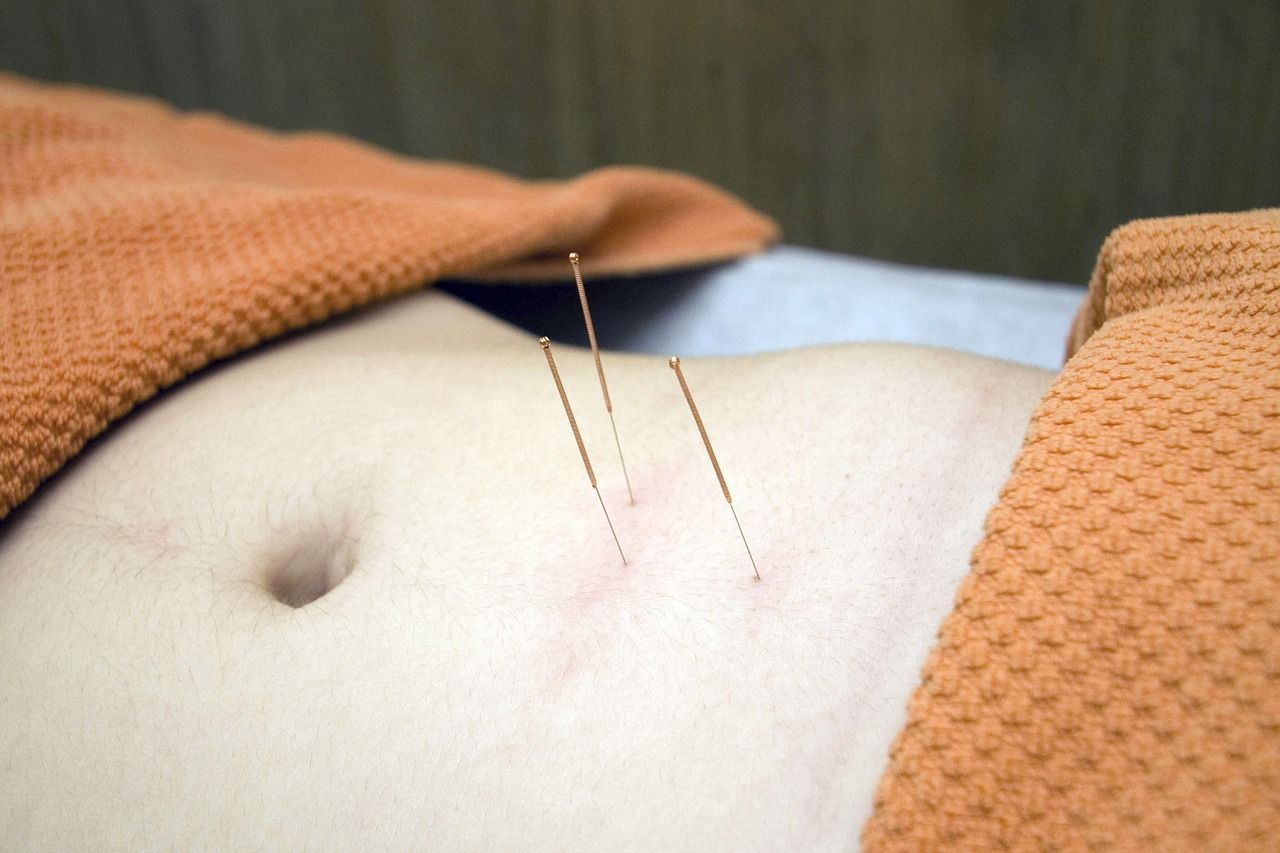
Some might be skeptical at the thought of acupuncture being helpful for PCOS but a review in 2011 found that it definitely has a role in naturally treating PCOS because it increases blood flow to the ovaries, and much more.
Another acupuncture option which has proven to hold promise is electro-acupuncture. A report from the Osher Center for Integrative Medicine in Sweden discovered that when you combine electro-acupuncture with exercise you get improved sex hormone levels, and improved menstrual frequency and hyperandrogenism.
7. Increase your Vitamin D and let the sunshine in

Between 67–85% of women with PCOS are thought to be vitamin D deficient. Maybe this deficiency isn’t a direct cause PCOS, but it can certainly contribute to a lot of the symptoms of PCOS, such as insulin sensitivity, obesity, diabetes, improving inflammation, reducing oxidative stress and more.
8. There are other PCOS supplements

There are a number of supplements, apart from inositol and vitamin D, which are great for PCOS. These supplements have been studied and proven to be effective for PCOS:
Magnesium Zinc
Calcium
Omega-3
Chromium
N-acetylcysteine (NAC)
Folic acid
Ashwagandha
9. A Chiropractor can help too
There isn’t a whole lot of research about the relationship between chiropractic medicine and PCOS. But nevertheless, there are some studies which show that improvement of spinal health does correlate with improved fertility and menstruation.
If you have PCOS, be aware and be cautious
PCOS is complex.
As mentioned above already, not every woman will react and respond to the same treatment as another woman. But with any new supplement, diet or exercise program, you need to check in with your doctor before starting anything.
If you plan on trying anything, don’t be the one to decide for yourself that you are going to discontinue any prescribed medications, without supervision.
Sometimes new medications and treatments can interfere with other medications and even impact on your insulin function. Zinc, for instance, is a mineral supplement that you shouldn’t take in big doses over long periods of time. That means you need to read instructions as well as precautions, taking only the recommended dosages.
We know that PCOS is a very prevalent condition, responsible for large numbers of women experiencing infertility problems in the modern world.
But still, there are many choices for managing and even reversing this condition with the array of Natural methods available and conventional medicines as well.
Even though not all the natural solutions will work in the same way that they do for another woman with PCOS, there are many choices that will prove to be effective.
If in doubt, see an endocrinologist

This expert is very familiar with PCOS because when it comes to adolescents and young women, patients should know that doctors’ don’t always know for sure whether you will definitely have PCOS.
Thing is, today we are seeing a rise of polycystic ovary syndrome in adolescent girls. This could be because we are seeing a rise, too, of obesity in these adolescent girls.
Though it is also very possible that even if adolescents stayed at a healthy weight level, they might have still carried the genes that predispose them to PCOS, but they wouldn’t have shown symptoms of the condition.
Many women with PCOS find that as they get close to menopause, their menstrual cycles become more regular. However, hormonal imbalances associated with PCOS don’t change with age so menopausal women can continue to have symptoms of PCOS.
Also, the risks that are associated with PCOS such as diabetes, stroke, and heart attack, increase with age, too. So, the risks for women with PCOS could be higher than those without PCOS for these illnesses later on in life.
Bottom line with PCOS is this: strive to steer clear of obesity and maintain a healthy weight, exercise, eat very healthy unprocessed foods and take natural supplements should your doctor deem it ok – these are probably the best 1st line of defense against PCOS.

For PCOS: remember to be patient, be positive, and be persistent.
Polycystic ovary syndrome or PCOS is a common hormonal disorder affecting about 10% of all women of reproductive age
PCOS is diagnosed when at least two of the following symptoms are present: irregular periods due to missed ovulation excess male hormone androgen as evidenced by lab tests or physical signs such as excess facial and body hair severe acne and baldness presence of numerous small fluid-filled cysts in the ovaries which can be seen as dark circles on an ultrasound image
this is the symptom that originally gave the condition its name but is not always present in PCOS patients PCOS is highly heritable but the inheritance pattern is complex with multiple genetic factors implicated in the susceptibility to the disease while the exact cause of PCOS is unknown disturbances in a number of hormones are thought to be responsible
PCOS patients usually have excess luteinizing hormone LH together with a relatively low level of follicle-stimulating hormone FSH and increased levels of insulin an ovary contains hundreds of thousands of immature eggs each of these is enclosed in a structure called a follicle each month a number of these follicles develop to compete with each other and one of them survives and gives rise to a mature egg that is released during ovulation
follicle development is mediated by FSH a pituitary hormone in PCOS patients FSH deficiency results in the arrest of follicular maturation the follicles stop halfway through their development and become cysts impaired follicular development means no mature egg produced or released hence the absence of ovulation
insulin is a hormone produced by the pancreas and it’s necessary for consumption of blood glucose by the body’s cells increased insulin level in PCOS patients as a result of the body compensatory response to insulin resistance associated with PCOS excess insulin together with high levels of luteinizing hormone induce and maintain overproduction of androgen by the ovaries common complications of PCOS include infertility
miscarriage or premature birth type-2 diabetes obesity cardiovascular diseases mood disorders and endometrial cancer, while the choice of treatment may depend on the patient’s individual concerns treating insulin resistance, is generally recommended for all women with PCOS lifestyle changes such as exercise dieting and weight loss and medications such as metformin can lower both insulins and androgen levels thus reducing the risks of type 2 diabetes and improving ovulation
patients who want to get pregnant may also be prescribed anti-estrogen medication such as clomiphene on the other hand when fertility is not the goal of treatment hormonal birth control a combination of estrogen and progestin is usually prescribed to regulate the menstrual cycle and reduce risks of endometrial cancer this treatment may also help improve acne and reduce extra body hair you

